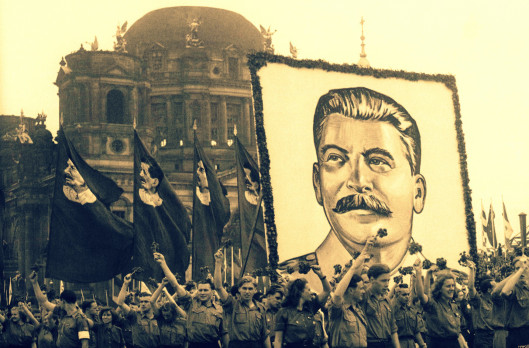Putin is using a terrible history in a disingenuous way to feed his obsession with "Ukrainian Nazis."
Last Paroxysm of the Tyrant
In Martin Amis’ underrated study of Josef Stalin, he asserted that Stalin’s much larger body count than Hitler’s was based on weapons the Nazi dictator did not have. Chief among these was that Stalin lived longer.
But luckily for the Jewish populace in Russia, time ran out for Stalin in March of 1953, when a stroke felled the 75-year-old. Mere days before his death he had authorized another purge, this time directed against prominent Soviet medical specialists who were Jewish.
Known as the “Doctors’ plot,” this group accusation epitomized Soviet “justice”: a manufactured conspiracy (Jewish doctors allegedly conspired to assassinate Soviet leaders); middle-of-the-night arrests followed by harsh interrogations (several men died under torture because they would not sign a “confession”); and a burgeoning list of suspects (the 37 accused soon mushroomed into hundreds of alleged collaborators). This episode was only unique in that it overtly publicized Stalin’s anti-Semitic hatreds, which had been more or less kept in check until then.
In his excellent new book, The Last Days of Stalin, Joshua Rubenstein takes us into this last spasm of paranoia and blood thirst. Aged, and plagued by disease, Stalin did what he always did with those closest to him—this time, the doctors ministering to the old man—and had them eliminated. The narrative is chilling. Rubenstein is able to extrapolate based on Stalin’s behavior during the purge trials held two decades earlier, and to calculate convincingly how this last campaign would have played out had its architect not assumed room temperature.
Rubenstein argues that the mayhem, having begun with the doctors, would have moved toward their families and relatives, and expanded into the general populace (the rationale being that anyone Jewish was in on the “plot”). Such was the dictator’s paranoia that he did not mind sacrificing the credit (rather questionably) earned by Russia as the antifascist nation that liberated Jewish prisoners from Nazi concentration camps.
But as with the purge trials of the 1930s, Stalin predicted that American communists would accept this conspiracy charge hook, line, and sinker. We know of course that he was right. The actor and singer Paul Robeson, a fellow-traveler who defended every twist and turn of Soviet policy for years, defended this pogrom, even after being told personally on a trip to the Soviet Union by a soon-to-perish Jewish friend what was really going on. Then, too, according to Rubenstein even mainstream publications like the New York Times considered that Stalin’s accusations might have some basis.
The Soviet populace, frightened and battered by the waves of terror that marked Stalin’s rule, behaved in its usual schizophrenic manner. On the one hand, Russians believed in the Kremlin’s rationale (a woman refused her baby medicine, suspecting that it had been poisoned by the Jewish doctors); but on the other, they feared that they, too, would be on the receiving end of the knock on the door. These would be the people who would weep the loudest when Stalin died.
Apart from international anticommunists, the people who emerge the best from this episode are the Russian dissident intelligentsia. Boris Pasternak immediately saw Stalin’s actions as a repetition of the 1930s horrors and lamented the deaths of Jewish doctors, many of whom were among the most loyal to the regime.
Like many books about Stalin, Rubenstein’s is hard to read. Stalin’s thirst for blood practically leaps off the page. As with the 1930s purge trials, the dictator, when told the captors were not “confessing,” advised the interrogators to “beat, beat, and beat again.”
And his inner circle, as ever, cynically encouraged this blood lust. The odious, child-raping secret police chief Lavrenty Beria, a bloodied veteran of the purge trials who was still responsible for keeping the Gulags bulging, used this opportunity to expand his power. Nikita Khrushchev, who would later moderate, in at least some respects, Stalin’s policies—and who would famously denounce the brutal tactics of his predecessor—comes off badly. For he too used the opportunity as a power-grab.
Save for Beria, who would be executed after Stalin’s death, the others in the Kremlin power elite quickly adjusted once Stalin was gone, and abandoned interest in “the Doctors plot.” Histories of the period suggest that their relief was mixed with anxiety. They were spared having to enact this new wave of meritless punishments—but would ordinary Russians now feel free to punish them, the henchmen of Stalin? Joshua Rubenstein’s book shows why they would worry.



